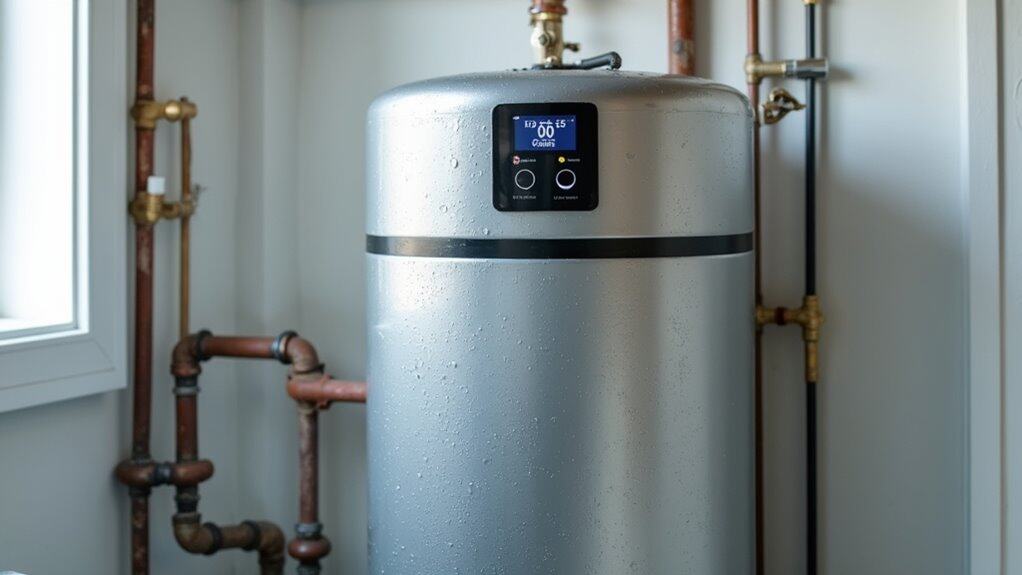Quality water softeners with upflow regeneration and salt-free TAC technology often go unrecommended by profit-focused plumbers. These systems save homeowners up to $558 annually but offer lower markup potential. Professional-grade units feature smart controllers and commercial components that reduce salt consumption by 75%, while compact models like NuvoH2O Manor deliver exceptional performance in small spaces. The conflict between customer value and contractor profit explains why the most effective solutions might never make it to your shortlist.
Key Takeaways
- Salt-free TAC systems are often overlooked despite preventing scale buildup while preserving beneficial minerals without electricity or waste.
- Upflow regeneration technology reduces salt consumption by up to 75% but may be ignored by contractors seeking quicker installations.
- Compact systems with high performance often outperform expensive alternatives but yield lower profits for contractors.
- Professional-grade water softeners with adaptive scheduling and programmable controllers offer superior value despite higher upfront costs.
- Contractors frequently prioritize familiar brands and quick sales over eco-friendly, low-maintenance options that benefit homeowners long-term.
Why Quality Water Softeners Get Overlooked by Questionable Contractors
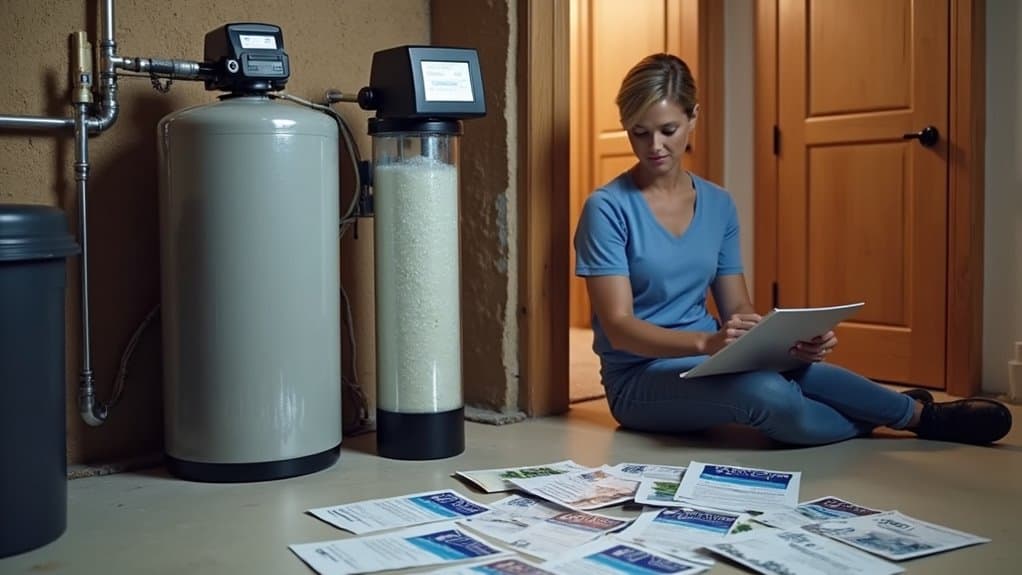
While many homeowners focus on the brand or price tag when shopping for a water softener, the quality of these systems often gets deliberately downplayed by contractors with questionable motives.
We’ve found that contractors avoid recommending premium systems due to three key factors.
First, high maintenance requirements like salt replenishment and resin bed regeneration create ongoing responsibilities they’d rather sidestep. Quality systems typically require checking salt levels regularly to maintain optimal performance, and many homeowners are unaware that elevating your water softener installation can significantly enhance system efficiency.
Second, installation challenges including space constraints and proper drainage setup add complexity they might undervalue.
Finally, the higher upfront costs of dual-tank or hybrid systems reduce their perceived profitability when focused on quick sales.
The Salt-Free Alternative That Threatens Traditional Installations
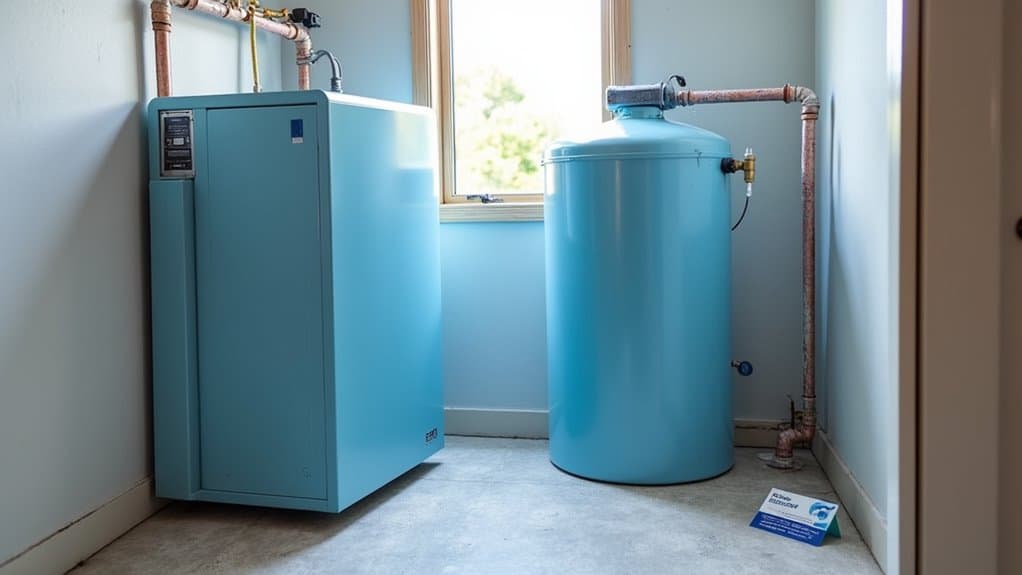
Salt-free water treatment systems have emerged as a disruptive force in the residential water conditioning market, challenging the dominance of traditional salt-based softeners.
Unlike ion exchange systems that remove calcium and magnesium, Template Assisted Crystallization (TAC) alters mineral ions to form harmless microcrystals that won’t adhere to pipes. This technology preserves beneficial minerals while preventing scale buildup. Additionally, these systems can significantly lower household power consumption, enhancing overall energy efficiency.
We’ve found contractors often resist recommending salt-free systems because they eliminate recurring service revenue from salt refills and maintenance. Salt-free systems require less maintenance and offer easier installation compared to their salt-based counterparts.
These eco-friendly alternatives also use no electricity, waste no water, and discharge no brine—addressing growing environmental concerns that have led to salt system bans in some regions.
Compact Systems: High Performance Without Premium Pricing
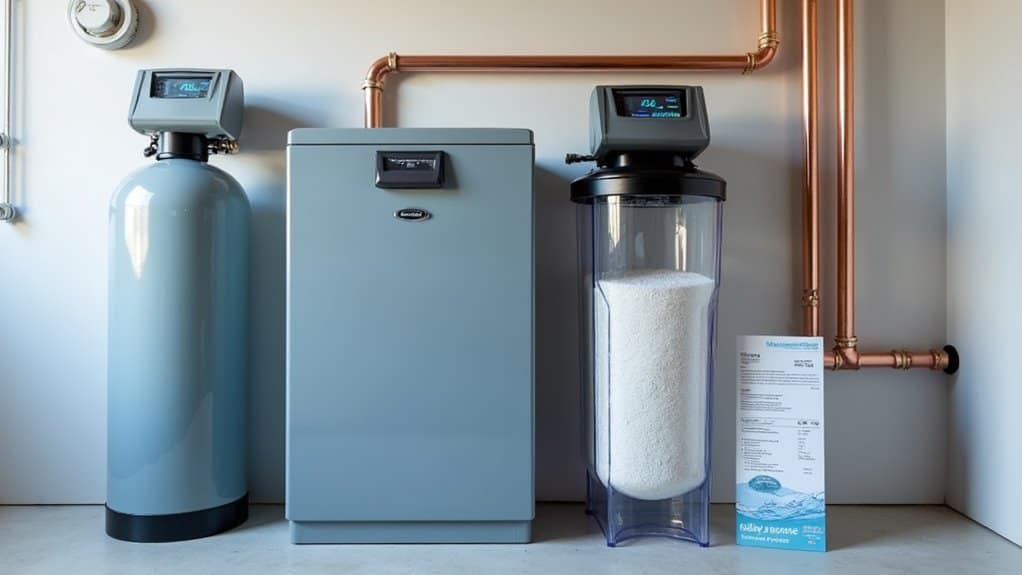
Despite their smaller footprint, today’s compact water softening systems deliver exceptional performance without commanding premium prices. We’ve analyzed several models that maximize space efficiency while maintaining high capacity operation. These budget-friendly options not only perform well but also often outperform more expensive alternatives in terms of efficiency and longevity.
| System | Footprint | Capacity | Special Feature | Cost Savings |
|---|---|---|---|---|
| Rheem PREFERRED | 14.5″×21.25″ | 18,000 grain | Learning Technology | $558/year |
| WaterBoss | 15″×19″ | Various | Rapid Regeneration | 60% less water |
| NuvoH2O Manor | Compact | Homes >1500ft² | Salt-free | No electricity |
| Traxx Mini | 10″×25.75″ | RV-sized | Smart Valve App | 2.0 gpm rate |
| Whirlpool WHES18 | Smaller profile | 18,000 grain | Demand Initiated | Energy efficient |
These systems regenerate efficiently, using significantly less salt and water than conventional units while handling high hardness levels. The Rheem PREFERRED Compact model is especially ideal for small spaces like condos and townhomes.
Key Features That Separate Professional-Grade From Budget Options
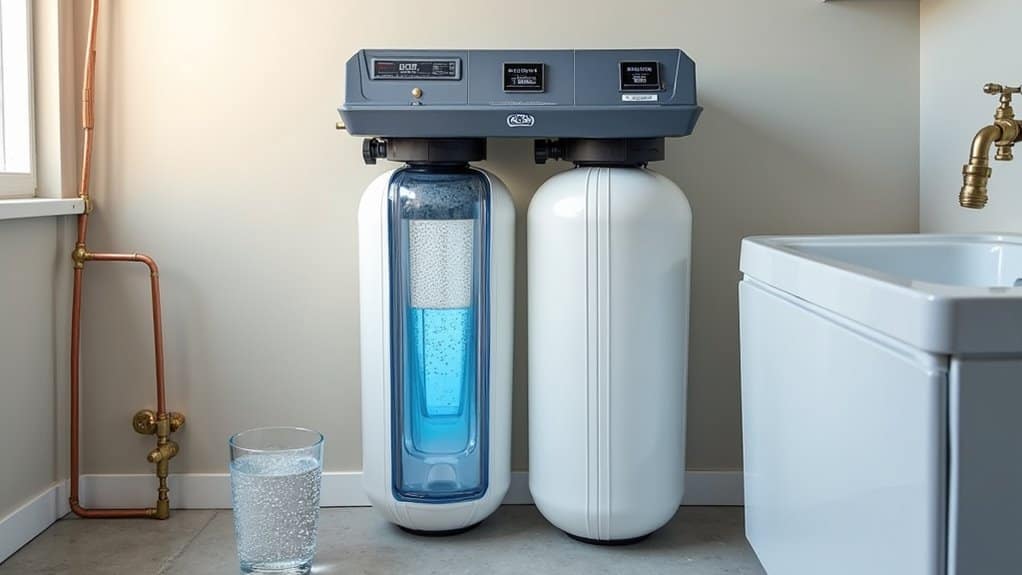
Professional-grade water softeners offer substantial advantages over budget options that justify their higher price tags.
We’ve found that upflow regeneration technology reduces salt consumption by up to 75%, while adaptive scheduling triggers cycles based on actual usage instead of fixed timers.
Look for systems with programmable controllers, LCD monitoring, and multiple operational modes that precisely match your household needs.
Commercial-grade materials like fiberglass-reinforced tanks and stainless steel manifolds dramatically extend system lifespan. The SoftPro® Pro Series provides 20% factory savings with its professional-quality system while still being accessible to homeowners.
Premium units also feature smart salt delivery, treated water brine refill, and high-capacity resin that optimizes performance while minimizing maintenance requirements.
Frequently Asked Questions
How Often Should Resin Be Replaced in a Quality Water Softener?
We typically recommend replacing resin in quality water softeners every 10-15 years, though this varies with water conditions. High-quality resin can last longer, while harsh water may necessitate earlier replacement.
Can Water Softeners Remove Lead and Other Heavy Metals?
No, standard water softeners don’t effectively remove lead or heavy metals. They’re designed for calcium/magnesium removal via ion exchange. For heavy metals, we recommend specialized filters like reverse osmosis or NSF-certified systems.
What’s the Environmental Impact of Salt Discharge From Water Softeners?
We’ve observed that salt discharge from water softeners significantly impacts ecosystems. It contaminates soil, reduces crop yields, disrupts freshwater biodiversity, and overwhelms wastewater treatment facilities with chlorides that can’t be effectively removed.
How Do Water Softeners Affect Well Water Systems Specifically?
We’ve found that water softeners benefit well systems by preventing scaling and extending appliance life, but they can corrode pipes, introduce bacteria, and discharge chlorides if not properly maintained with pre-filtration systems.
Are There Water Softeners Designed for Homes With Low Water Pressure?
Yes, we offer water softeners designed for low pressure homes. They feature special valve designs, pressure-optimized resin beds, and larger flow paths to minimize pressure drops during regeneration cycles.
Conclusion
We’ve examined why superior water softeners often get sidelined by contractors prioritizing profits over performance. Salt-free systems deliver exceptional results without the maintenance costs of traditional units. Today’s compact designs offer professional-grade functionality at reasonable prices. When selecting your system, focus on resin quality, control valve durability, and flow rate capacity—features that distinguish truly effective softeners from their mediocre counterparts.

Craig “The Water Guy” Phillips is the founder of Quality Water Treatment (QWT) and creator of SoftPro Water Systems.
With over 30 years of experience, Craig has transformed the water treatment industry through his commitment to honest solutions, innovative technology, and customer education.
Known for rejecting high-pressure sales tactics in favor of a consultative approach, Craig leads a family-owned business that serves thousands of households nationwide.
Craig continues to drive innovation in water treatment while maintaining his mission of “transforming water for the betterment of humanity” through transparent pricing, comprehensive customer support, and genuine expertise.
When not developing new water treatment solutions, Craig creates educational content to help homeowners make informed decisions about their water quality.


